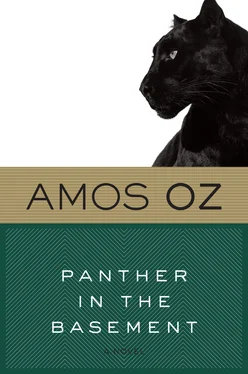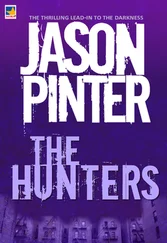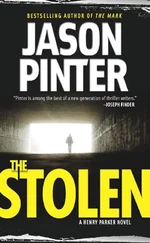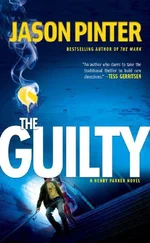By the middle of the summer I was preparing plans for a Hebrew Armada, with destroyers, submarines, frigates, and aircraft carriers. I was planning to investigate the possibility of a coordinated lightning strike on the British naval bases all around the shores of the Mediterranean, in Port Said, Famagusta, Malta, Mersa Matruh, Gibraltar. Only not here, in Haifa, because they would obviously be expecting something here. Were there any other British bases in the Mediterranean basin? I was planning to put this question to Sergeant Dunlop at our next meeting in the Orient Palace Café. I could ask him with apparently innocent curiosity the sort of question you might expect to hear from a child who was interested in geography. But on second thought I dropped the idea, afraid that simply putting the question might arouse suspicion, and thus jeopardize the element of surprise that was vital to the success of our plan.
Better to ask Father.
But in fact there was no need to ask anyone. I could check it for myself. I could correlate information freely available in the encyclopedia with other information freely available on the maps in the atlas. The correlation of freely available sources can sometimes yield valuable secret information. (I still believe this. Sometimes I put an ostensibly innocent question to somebody, such as, What is your favorite view? And later on in the conversation, after half an hour or so, I casually ask what he or she wanted to be when they grew up. I compare the two answers in my mind, and I know.)
The Hebrew Armada never put to sea, and now it never would. Instead, I was to face a court martial on a charge of low-down treason and passing secrets to the enemy.
I thought to myself: You could even call Robin Hood a traitor. However, only a petty person would concern himself with that aspect of Robin Hood. Even though it did exist. It's a fact.
But what is treachery really?
I sat in my father's chair. I switched on the desk lamp. I took an oblong card from the pile. I wrote on it something like this: "Check whether there is any connection between the word boged, 'traitor,' and the word beged, 'clothing.' Cf. 'a wolf in sheep's clothing.' " A traitor covers things up, just as clothes do. And clothes get torn just when you least expect it. Also, if you put warm clothes on, there's a heat wave, and if you dress for the hot weather, suddenly it's freezing cold. (Though in point of fact the treachery here is due to the weather, not to the clothes.) In Bible class with Mr. Zerubbabel Gihon, we studied a verse from Job: "My brethren have dealt treacherously as a river." Not the peaceful rivers of the Ukraine that Mother talks about so wistfully, but the rivers here in the Land of Israel: treacherous rivers. In the heat of summer, when you are thirsty, they give you burning gravel instead of water, whereas in winter when you are walking along the riverbed, they suddenly flood. The Prophet Jeremiah laments: "For the house of Israel and the house of Judah have dealt very treacherously against me, said the Lord." And Jeremiah, too, was called a traitor: they tried him and found him guilty and threw him in a pit.
Whereas the expression "low-down," I noted on another card, means vile or base. Low can mean low-spirited, gloomy, or depressed. It is related to lowly, meaning pitiful or humble. Or mean. So is low the opposite of proud or arrogant? Ben Hur Tykocinski is arrogant, but he is also mean. (And how about me? I didn't have the courage to write to Yardena and apologize for spying on her.) I must ask Sergeant Dunlop how you say "low-down traitor" in English and whether English also has a connection between treachery and clothing and between baseness and humility.
Will I ever see him again?
Asking myself this question made me miss him. Naturally I never forgot for a moment that he belonged to the opposite side, to the enemy. But he was not a private enemy, although he was a private. He was mine.
I can't put it off any longer. I must talk now about Sergeant Dunlop and about our relationship. Even though it's hard for me to do so.
We used to meet secretly three or four times a week in the back room of the Orient Palace Café. Despite its name, this was actually a run-down tin shack covered with a dense jungle of passionflower, in a little alley to the west of the army camp. In the front room there was a billiard table covered in green baize, which was always surrounded by a perspiring group of English soldiers and policemen and a few young Jerusalem men with smart shirts and ties, Jews, Arabs, Greeks, Armenians, with gold rings and greased-down hair, as well as two or three girls floating on clouds of perfume. I never lingered in this front room: I reminded myself that I was there on a mission. I never peeped in the direction of the barmaid. Everybody who spoke to her tried to make her laugh, and nearly everybody succeeded. She had a habit of leaning forward as if she was bowing whenever she pushed a glass of frothy beer to the front of the bar, and as she did so a deep cavern opened up in the top of her dress, and some people might have found it hard not to look, but I never so much as glanced at her.
I would hurriedly cross this front room, which was full of laughter and smoke, and go on into the inner room, which was quieter and had only four or five tables, covered with oilcloth printed with flowers and Greek ruins. Young men sometimes sat there playing backgammon, sometimes a couple or two sat close together, but unlike the outer room, people there spoke in whispers. Sergeant Dunlop and I used to sit for an hour or an hour and a half at the table in the corner, with several books open in front of us: a Hebrew Bible, a pocket dictionary, a first English reader. Now that more than forty-five years have gone by, and Britain is no longer an enemy, and the Hebrew State exists, now that Ben Hur Tykocinski is called Mr. Benny Takin and owns a chain of hotels, and Chita Reznik earns his living repairing solar water heaters, and I still chase words and put them in their proper places, I may as well write this: I betrayed no secrets to Stephen Dunlop. Not a single one, not even a little one. I didn't even tell him my name. Right to the end. All I did was to read the Bible with him in Hebrew and teach him some modern words that are not in the Bible, and in exchange he helped me to learn the rudiments of English. He was a perplexed and, by his own account, lonely man. He was a large, broad man, pink-faced, spongelike, a bit of a gossip, and he blushed a lot. His legs below his shorts seemed pudgy and hairless, with little wrinkles like those you see on the limbs of a baby who has not yet learned to walk.
Sergeant Dunlop had brought with him from Canterbury, his hometown, a kind of Hebrew that he had learned from his uncle, the vicar. (His brother, Jeremy Dunlop, was also in the church: he was a missionary in Malaya.) His Hebrew was soft, like cartilage, as though it had no bones. He had no friends, he claimed. ("Neither have I enemies or foes," he added without my asking.) He was serving in the British Police in Jerusalem as an accountant and pay clerk. Occasionally, when there was an emergency, he would be sent to guard a government office for half a night or to check identity cards at a roadblock. I recorded all these details in my memory the moment they came out of his mouth. In the evening, when I was at home, I wrote it all down in a notebook to swell the information stored at the FOD Organization headquarters. Sergeant Dunlop was fond of retailing little items of gossip about his friends and superiors: which one was a miser, a dandy, a sycophant, who had recently changed his aftershave, which high-ranking CID officer had to use a special antidandruff shampoo. All these details made him giggle, which embarrassed him, but he still found it hard to stop. Major Bentley had bought a silver bracelet for Colonel Parker's secretary. Lady Nolan had a new cook. Mrs. Sherwood left the room in disgust every time Captain Bolder came in.
Читать дальше












